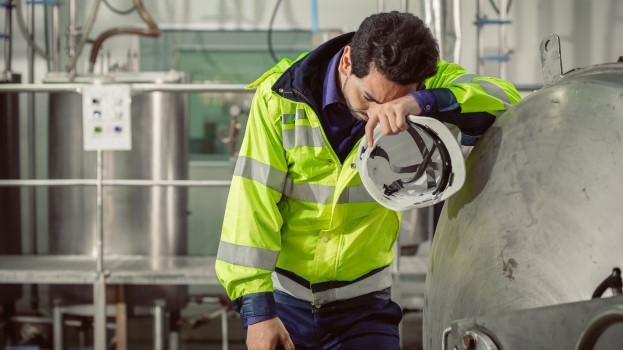How to recognise the signs of fatigue, and why fatigue matters on the railway and across transport and infrastructure for health and safety.

Fatigue affects much of our daily lives and is harmful. You may not even realise you are fatigued. But what is its impact on health and safety?
The Office of Rail and Road defines fatigue as weariness or general tiredness from working for too long, working against our body clock (for example regular night shifts), heavy physical or mental workload, or not getting enough good rest or sleep.
Fatigued, you're likely to be less alert, less able to process information, and will take longer to react. You may be more likely to make mistakes and take risks or ignore safety rules.
You can also perceive risk differently and have reduced alertness and co-ordination – without realising. This is alarming in safety-critical jobs, but fatigue is an issue whatever your work. Network Rail has updated its fatigue risk management standard to highlight its importance.
Recent RSSB analysis of investigation reports showed fatigue as a factor in about 20% of high-risk rail incidents.
Our own analysis – of CIRAS reports from April 2019 to January 2022 – shows that our reporters felt the most likely outcomes from fatigue concerns were major accidents, such as a road traffic accident or a train accident (including collisions, derailments or signals passed at danger). Accidents to individuals, such as trips or falls, were cited as the next most likely potential outcome, and shift design seen as the root cause of most fatigue concerns. About 10% of the concerns that come to us each year are about fatigue.
Recognising the signs
Fatigue can be mental – from long concentration or doing something mentally challenging – or physical, from physically challenging tasks. It can develop quickly, after a burst of activity, but also over time, through losing sleep.
Feeling tired to the point where you struggle to concentrate or stay awake can indicate fatigue. So can irritability. And after 17-19 hours without sleep, the negative effects on your performance can be similar to being over the drink-driving limit.
If you are fatigued, remember to report it to help stop a potential incident.
Raising concerns
Whether you are concerned that fatigue isn't being managed effectively, you think ways of working are making fatigue more likely – or you're worried about issues which are causing your own fatigue – please speak up and tell someone. Remember, you can raise your concerns about fatigue confidentially by using CIRAS.
At CIRAS, we realise fatigue is personal. It can be hard to talk about for many reasons, such as why you're fatigued and if you fear consequences for speaking up, especially if it means sharing that you've made a mistake or fallen asleep.
We protect your identity before passing on your concern and throughout our process – and we let you know the result of speaking up through us.
Raise your concern confidentially
Healthy choices
- Fatigue can be directly or indirectly linked to health status, including heart disease, diabetes, digestive diseases and depression. So reducing your fatigue may benefit your health. It could also be a good idea to see a doctor if fatigue is an ongoing issue, to help you rule out any underlying health issues.
- Foods with high sugar and refined carbohydrates – like white bread, biscuits, crisps and cakes – lead to lethargy and poor concentration after any initial burst of energy. Better foods to maintain energy levels include wholegrains – such as brown rice and brown bread – wholewheat pasta, potatoes, and high-protein foods: chicken, fish, eggs, beans and pulses. See the NHS guide to a diet for energy.
- Coffee is not a complete fix for fatigue. Caffeine may temporarily boost alertness, but you can't rely on it to remove fatigue symptoms. You need sleep to recover. Dehydration can make you sluggish, and water is a better choice to rehydrate yourself.
- It's easier said than done to sleep more, but shift workers may benefit from strategic naps. To coincide with natural dips, naps are best between 01:00 and 06:00 and 14:00 to 16:00. For information about sleep, including for shift workers, see The Sleep Charity or call the National Sleep Helpline on 03303 530 541.
Find out more
How to get a good night's sleep
Six lifestyle tips to reduce fatigue
Watch our webinar on fatigue risk management and preparing for the Network Rail standard
How to avoid being sucked down the exhaustion funnel
Tags
- Fatigue
- Health and Wellbeing
